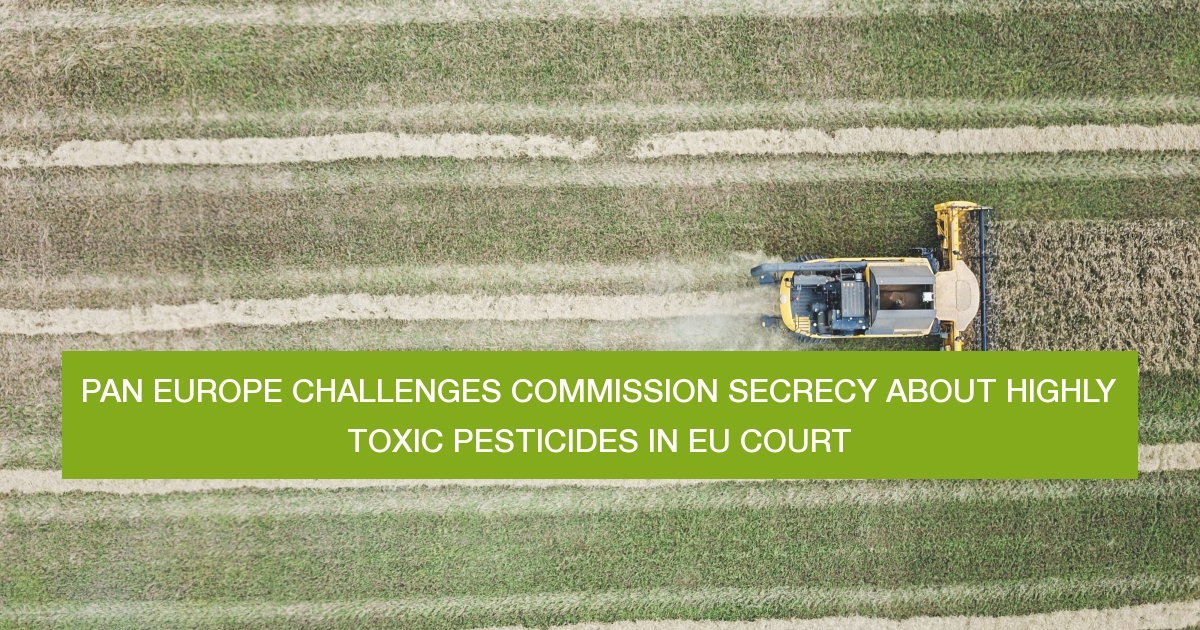By law, European citizens have the right to know why highly toxic pesticides are kept on the market, against scientific advice. The EU Commission refuses to respect the law. they did not respond to an Access To Documents (ATD) requests from PAN Europe. We would like to have a better understanding why cypermethrin, a highly hazardous pesticide, was reapproved by the Commission. this despite the negative opinion from the European Food Safety Authority (EFSA). PAN Europe has decided to bring this transparency issue to the EU Court.
Access to environmental information is an important citizen's right to protect their interest to live in a healthy environment. In the EU, this right is ensured by the “Aarhus Regulation”. [1] In parallel, a second regulation allows civil society to ask the EU institutions for access to documents used in their work. [2] These two pieces of law are crucial for civil society to exercise its right to scrutinise decisions such as the approval of the release of pesticides into the environment.
Yet, on two recent occasions [3], the Commission acted against these two regulations by refusing to provide PAN Europe with communications with Member States, as well as Commission internal communications.
Martin Dermine, executive director of PAN Europe explains: “Our two requests for access to information concern insecticides assessed by EFSA as highly toxic to both bees or human health. Such conclusions should lead to their ban in the EU. There have been long and hectic discussions between the Member States and within the Commission. One of these insecticides is Sulfoxaflor which was finally banned for outdoor uses. The second is Cypermethrin which, for obscure reasons, was renewed for seven years.”.
The two document requests [4],[5] were sent after the decisions were adopted. An important judgement of the General Court of the EU which stressed that the Commission is not entitled to systematically dismiss requests for information on the positions of Member States expressed in the frame of (re)approval procedures. Yet, this is precisely what the Commission did. So we took the cypermethrin information case to court.
Salomé Roynel, a policy officer at PAN Europe added: “It is shocking to observe that the Commission refuses to respect a judgement from the General Court and apply the rule of law. This goes against EU's democratic rules and is a very worrying signal. The fact the Commission appeals the judgement in the Pollinis verdict does not allow them to not implement the ruling in the meantime. This obstruction of transparency is particularly concerning coming from the very institution entrusted with the responsibility of ensuring the proper application of the European treaties and Regulations.”.
Salomé Roynel concluded: “The Commission's approach should be one of working towards greater transparency in its work. The rejection and the appeal in the Pollinis ruling suggest that the institution’s intent is contrary to contain the increasing public scrutiny of its work. This is very alarming to us.”.
On Tuesday 21 February, PAN Europe filed an appeal to the General Court of the EU to force the Commission to comply with EU Regulations and provide the requested documents on cypermethrin.
Contact PAN Europe, Salomé Roynel, +32 2 318 62 55, salome [at] pan-europe.info
Notes:
[1] Regulation (EC) No 1367/2006 of the European Parliament and of the Council of 6 September 2006 on the application of the provisions of the Aarhus Convention on Access to Information, Public Participation in Decision-making and Access to Justice in Environmental Matters to Community institutions and bodies
[2] Regulation (EC) No 1049/2001 of the European Parliament and of the Council of 30 May 2001 regarding public access to European Parliament, Council and Commission documents
[3] In the context of its internal review request on Cypermethrin’s approval, PAN Europe has requested access to the European Commission's internal communication in preparation for its reply. In the second case, following a judgement from the General Court (Pollinis France v Commission, Joined Cases T‑371/20 and T‑554/20), PAN Europe asked the Commission to provide the position from Member States in the frame of the reapproval process of 2 highly toxic insecticides, namely Sulfoxaflor and Cypermethrin.
[4] ATD 1
[5] ATD 2

